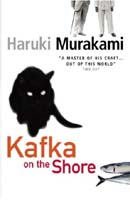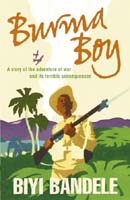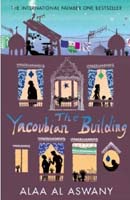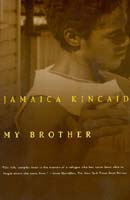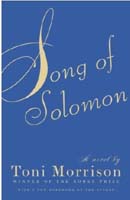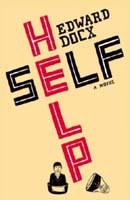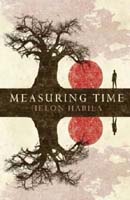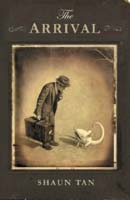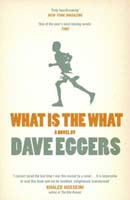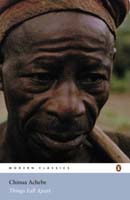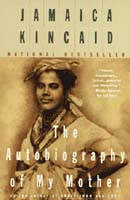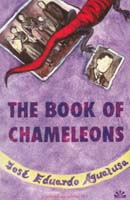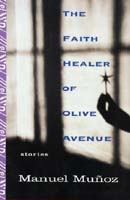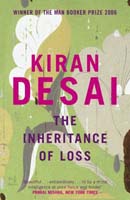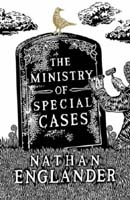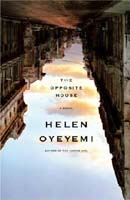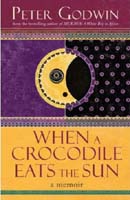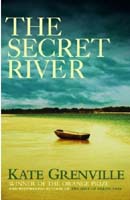|
Akin Adesokan
Measuring Time by Helon Habila (Hamish Hamilton).
This is an enjoyable book in many ways, not least because of its
touching story. Two brothers; one gifted but limited by sickness,
the other physically courageous but eventually wasted by the cruelties
of his time. The idea of disability--the protagonist is a sickle-cell
patient--is innovative and sustained throughout. Habila also avoids
an easy formula by dispensing with the cliché of incompatible
twins and, in spite of the problem of omniscience that sometimes
slows down the narrative, succeeds in giving the reflective reader
a story of unusual warmth in a place which time might otherwise
have ignored.
Old Masters: A Comedy by Thomas Bernhard (Phoenix
Fiction; tr.1989). I also enjoyed reading this little book
by the late Austrian novelist and playwright. An intense book which
demands and rewards total attention, "Old Masters" is
not new, having been published in translation in the year of its
author's death. But it is my introduction to Bernhard's work and
I'm grateful. The novel is a paragraph-long tirade against all the
masters of European art, music, and philosophy, a personal attack
on all the institutions in Austria, but it is very funny and written
with great care and an enviable sense of form. In those parts where
the narrator, Aztbacher "records" the ills of Austria,
his country, all a Nigerian reader needs to do is delete Austria
and insert Nigeria.
Chimamanda Ngozi Adichie
I have always been drawn to fiction that looks at the world through
a romantic-realist lens and Tahmima Anam’s novel about a family
affected by the Bangladeshi war of independence, A Golden
Age (John Murray), does that well. Biyi Bandele’s
Burma Boy (Jonathan Cape) is a humorous story of
Africans fighting in the Second World War.
Segun Afolabi
Judging short story awards allowed me to wallow in the form for
most of 2007. Two very different collections I’d highly recommend
from the shortlist of the Frank O’Connor International Short
Story Award are Charlotte Grimshaw’s Opportunity
(Vintage; NZ) and Manuel Munoz’s The Faith Healer
of Olive Avenue (Algonquin Books; US). Grimshaw’s
very immediate, thrilling and often unsettling stories are set mainly
in New Zealand. In ‘Him’, a menacing
charmer threatens to overwhelm a mother and son. In contrast, Munoz’s
tales are slow-paced, poignant and wistful, examining the lives
of Mexican Americans in California. In the title story, a father
caring for his disabled son hands over his life savings in exchange
for a miracle cure.
Afam Akeh
Allow me a shift in focus from prose-fiction, which will have its
many subscribers, to poetry and literary criticism, specifically
to two publications of groundbreaking importance to African literature.
African literary criticism and its theories have mostly been collected
in journals and some country or subject specific anthologies, especially
anthologies with the postcolony, diaspora, and oral traditions as
their focus. But African Literature: An Anthology of Criticism
and Theory (Blackwells; 2007) attempts a comprehensive
and transnational compilation of the significant commentaries from
years of committed work by critics and theorists of the African
expression. Editors Tejumola Olaniyan and Ato Quayson certainly
capture the many moods, moments and wide-ranging thoughts of their
subject. As a central interpretive document for the contemporary
formulation and understanding of an African aesthetic this book
is already invaluable, but it is even better received as part of
a larger communal project, the common interest in locating, placing
and centering African perspectives and the experience that informs
them. There are essays missing from this compilation that should
gain favoured status in a second volume.
The Other Half of History: An Anthology of Francophone
African Women’s Poetry (The Heaventree Press; 2007) is my
other choice. Editor Georgina Collins is not entirely without peers
in her translation work on Francophone African women’s poetry.
But her anthology still represents a significant trans-boundary
leap forward for African poetry. Her translator’s introductory
notes to the book are especially revealing. The Francophone women
poets anointed in this anthology are not just mere beneficiaries
of some gender positioning politics. They deserve our attention
and some are possibly victims of double historic wrongs, being not
as centrally known and celebrated especially in Anglophone Africa
as their male contemporaries, a wrong this publication successfully
challenges.
Ike Anya
Edward Docx's Self Help (Picador)
combined all the elements that I enjoy in a novel. It taught
me about life in contemporary Russia; it sung in lyrical language;
it had me catching my breath in suspense at what would happen next;
it made me laugh out loud as it satirized the inanity of modern
workplace-speak; it made me think about the complex and intriguing
bonds of family; the paradoxes of politics and relationships.
I put it down with regret.
Helen Oyeyemi's The Opposite House (Bloomsbury)
I loved for its bold, whimsical portrayal of an immigrant family
set in London, but spanning several continents. Ostensibly
about a Cuban family, I sensed the echoes of the lives of Nigerian
immigrants resounding through the pages. Biyi Bandele's Private
Banana in Burma Boy made me laugh, but also made me think about
the unwritten histories, the untold stories... Finally, Dave Eggers'
deftly rendered account of the life of Valentino Achak Deng
had me laughing one minute, near tears the next, and at the end
had me asking: "What is the What?"
Gabeba Baderoon
Unconfessed by Yvette Christianse (Kwela, 2007).
Unconfessed is the stunning fiction debut of the poet Yvette Christianse.
The novel tells the story of the slave woman Sila van de Kaap, and
was inspired by the true story of a slave in the Cape who was imprisoned
on Robben Island for murdering her child. Unconfessed memorializes
in fiction what is largely silent in the historical record –
the reality of the lives of tens of thousands of people brought
to the Cape as slaves in the seventeenth and eighteenth centuries
from Mozambique, India and South-East Asia. With its powerful,
poetic narrative, Unconfessed revolutionizes fiction about
slavery in South Africa.
Women in South African History: Basus’iimbokodo, Bawel’imilambo/They
Remove Boulders and Cross Rivers, Edited by Nomboniso
Gasa (HSRC Press, 2007). This important book brings together
feminist historians, literary scholars and gender activists to rewrite
the history of South Africa - to reflect the fundamental contributions
of women. In essays about the great women's marches of the 1950s
that shaped the resistance politics of the apartheid era, the role
of the prophetess Nonqawuse and the memory of slavery in South Africa
- as explored by Pumla Dinea Gqola, “Like three tongues
in one mouth: women in (slavocratic) South Africa -, Nomboniso Gasa's
book is an indispensable new collection on South African history.
Brian Chikwava
My best reads this year have been by first time novelists Nathan
Englander and Tod Wodicka. The Ministry of Special Cases
(Faber & Faber) – is Nathan Englander’s Kafkaesque
story set in Buenos Aires at the height of the Argentine state’s
lawlessness. For one Jewish family, strange things are happening
out there. But these unusual circumstances creep into their lives
and soon their teenager disappears the same way other people have
been ‘disappearing’. The family’s search for a
loved one who has ‘disappeared’, brings it face to face
with an essentially terrorist state.
All Shall Be Well; And All Shall Be Well; And All Manner
of Things Shall Be Well (Jonathan Cape). An exceptional,
tragic and hilarious novel by Tod Wodicka. One of the most compelling
anti-hero novels this year, its protagonist is a medieval re-enactor
in New York who chooses centuries to escape into, whenever he can,
because he cannot face up to the reality of his family relationships
as they fall apart.
Teju Cole
The best book I read this year was All Day Permanent Red,
Christopher Logue's verse reworking of the first battle scenes of
The Iliad. The ancient Greeks were not moralists; they were musical.
Logue brings that across with jaw-dropping immediacy and skill.
I was also taken with Sefi Atta's collection, Lawless and
Other Stories. Her funny, skeptical and wise voice has
enlarged the already unwieldy territory of Nigerian writing.
Jude Dibia
I feel like an 'old bloomer', having just read Song of Solomon,
Toni Morrison's 1977 novel (Picador). I find Morrison to be one
of the most profound living writers and with Song of Solomon, she
creates a world full of characters with a history as rich and
devastating as any recorded in African American past. With one of
the most memorable opening sequences I have come across in a work
of literary fiction (Mr. Smith of the North Carolina Mutual
Life Insurance poised at the top of a building moments away from
plunging himself down and a waiting gathering of different people with
a mother in labour, unknown that the life of the child born that
day would be tied to that very event and many of the unsuspecting
spectators waiting for Mr. Smith), this book was meant to be read
and re-read. Beautiful!
Ever since I read Arundhati Roy’s The God of
Small Things years ago, I have been fascinated by female
writers of Indian origin. When the 2006 Booker Prize winner was
announced, I knew nothing was going to stop me from reading the
winning entry 'The Inheritance of Loss'. A blurb
on the front cover of the edition I have said: “If book reviews
just cut to the chase, this one would simply read - This is a terrific
novel! Read it.” I could not have put it any better. Kiran
Desai took on some weighty themes with this book and the interweaving
of events, locales and a sprinkling of memorable characters makes
this one of my best reads this year.
Aminatta Forna
Peter Godwin's When A Crocodile Eats The Sun (Picador)
– is a follow up to Mukiwa, his memoir of
growing up in Rhodesia. This is a moving, tender and harrowing portrait
of a family, set against the backdrop of a country's descent into
chaos. Helon Habila's Measuring Time – by
one of the star writers of our time. An enchanting and subtle tale
of two brothers.
Dayo Forster
I'm choosing two books I was a bit surprised by - in terms of how
much I enjoyed them. Allah Is Not Obliged by Ahmadou
Kourouma (Vintage). With what seems like a swearword a page, a young
boy gives his refreshing angle on war in West Africa. Politically
incorrect yet very true to the heart in descriptions of how warlords
take command in idiosyncratic battles. Brutal and sometimes even
funny. Things Fall Apart by Chinua Achebe (Penguin
Classics). Unfortunately, I was put off this title when I was younger
because every single one of my older four siblings studied it at
school and we seemed to have an excess number of copies at home.
Wonderful to read now in its calm depiction of an Africa long gone,
how change happens and how we need to figure out how to cope with
it, disastrously or not.
Muthoni Garland
Cuba on the Edge: Short Stories from the Island
(Mary G. Berg, Pamela Carmell & Anne Fountain Eds; CCC Press,
2007). An amazing anthology of short stories. It offers funny and
intelligent insights about the life of ordinary people with capitalistic
desires hustling to survive and live with dignity in a
socialist republic.
Nicole Krauss’ The History of Love
(Penguin). The old man and the young girl who narrate the story
are fragile yet resilient, honest and engaging. Perhaps, as I get
older, I begin to worry about the indignities of old age –
the way a person’s body can let them down even when their
spirit is urging them on. Like the old man in the book, I’ve
started to think about my legacy (or the lack thereof).
Kwani 4 (Binyavanga Wainaina Ed; Kwani Trust).
An eclectic mix of stories, poems, rants and essays, a faithful
bedside companion that I dip in and out of. Uneven quality
of contributions but includes some of the funkiest writing
and stimulating contemporary thinking in Kenya. Yes,
I am a contributor...
Nnedi Okorafor-Mbachu
The Arrival by Shaun Tan (Hachette Children’s
Books): This was one of the most unique books I've seen in quite
some time. It's a novel without words, told completely in pictures.
It's complex story, and digs deep into the immigrant experience
using fantastical elements.
What s the What by Dave Eggers (Hamish Hamilton):
I loved this fictionalized memoir of one of the Sudanese Lost Boys.
It's vivid, optimistic, tragic, honest, and what a great main character.
What was coolest was how the United States is presented not as the
romanticized Promised Land but just another place with positives
and negatives.
Wadzanai Mhute
The Inheritance of Loss by Kiran Desai (Penguin).
The interweaving of lives in India and America is exquisitely described
in this award winning book. Desai adds humour in humourless situations.
Biju’s immigration experience is insightful about the struggles
illegal immigrants face in America, but with a string of misfits
like Saeed and the gang we also laugh at their misadventures and
solutions. The Indian countryside and the isolated lives of its
inhabitants is relatable because Ms. Desai touches on the individual
personalities that can be found in any metropolis or remote corner
of the globe. The author laboured over this book for seven years,
and it is obvious that she took pains to pick the exact words in
order to describe the beauty and isolation of Kanchenjunga. Beautifully
written.
The Secret River by Kate Grenville (Canongate).
Maybe it is because I was raised in a former British colony, or
perhaps it is my reading of British authors that made this novel
read a bit like coming back home. The story was familiar because
of its similarity with Charles Dickens’ London; I knew this
world of the poor working class. This book is for readers of classic
British novels; it will transport you to school days and forced
readings of Dickens, DH Lawrence and Kipling, to name a few. Though
it was inspiring to discover that one can succeed and prosper in
a foreign country, it was sobering to learn that in this case it
was at the expense of the native Aborigines. The sadness is greater
because one realizes that this is a story that was repeated in most
former colonies. Grenville’s ability to draw the reader in
and her finely crafted words are reasons why I am looking forward
to her future work.
Blessing Musariri
My two books - Burma Boy by Biyi Bandele (Jonathan
Cape) and Jose Eduardo Agualusa’s The Book of
Chameleons (Arcadia). Both books I thoroughly enjoyed because
they were very different stories to what one usually gets. In a
way, both are about wars and have very distinct and original characters.
I loved the use of language in Burma Boy, mainly in dialogue and
the comedy was very cleverly brought out. The Book of Chameleons
has a philosophical aspect to it which I liked and the
voice of the Chameleon was compelling in its descriptions and storytelling
- very cleverly written.
Wale Okediran
Burma Boy by Biyi Bandele (2007) is a well researched
book of war, love and friendship. The fast pace coupled with the
author’s liberal use of Hausa words is a good historical record
of the activities of Nigerian soldiers in the service of the colonial
army. The author succeeded in lacing nerve chilling war encounters
with witty and poignant anecdotes.
Season of Migration to the South by Kole Omotoso
(1994). The author’s experience as a long time voyager on
the African continent is his outstanding claim to write a book of
this quality. In his very popular Just Before Dawn, he wrote about
the colonial experience and post-colonial transition in Nigeria.
Season of Migration to the South is his own experiential comparison
between Nigeria and South Africa, with a lot of other insights gathered
from his travels through Africa, the West Indies and Europe thrown
in as well. It is a timely book given the current state of transition
in South Africa. The encouraging tone of the book coming from someone
with a vast travel experience will be a good antidote to the fashionable
cynicism and depression of commentaries about Africa.
E.C. Osondu
It was a cruel, gray, typical upstate New York winter. I was teaching
in a small college in the outskirts of the city. It was a long forty-five
minutes’ commute and the only thing of interest en route was
the burial place of a female missionary Laura Maria Sheldon who
had tried to convert the Seneca Indians. And of course there was
the sprawling Onondaga cemetery where I once counted ten tombstones
with the name Muldoon as the bus crawled past. I took out two books
by Jamaica Kincaid - The Autobiography of my Mother and
My Brother (Farrah Strauss & Giroux). One cold
gray day, while on the Centro bus, I opened The Autobiography
of my Mother and began to read. Suddenly a burst of tropical
sunshine exploded in the bus, I was suffused with warmth and wonder
and gratitude. This story of a young female orphan’s search
for a place in the world on a small Caribbean Island, remains like
no other book that I have read. One reads books and says, this reminds
me of this other book, only Jamaica Kincaid reminds you of Jamaica
Kincaid.
Wumi Raji
Niyi Osundare seems to exercise an unusual control over his moods.
In 1986, rising from his hospital bed, following an attack with
axes, cutlasses and cudgels by as yet unidentified individuals,
the Ikere born poet launched a collection in which he weaved love
songs to the moon. Last year again, after extricating himself from
the jaws of Hurricane Katrina which destroyed his New Orleans’
home, Osundare went to his publishers with a manuscript titled Tender
Moments. The collection contains love poems all through,
and this, for me, is totally surprising. Surprising because Osundare
is normally reputed to be a political poet and, as has just narrowly
escaped death. It surprises me that a person who had just experienced
such a terrible scare can immediately develop the courage and optimism
it takes to sing about love…
I am myself in love with Tender Moments. The collection
lives up to its title. Its lines are soft and sweet and sensuous,
and they taste like delicately ripe pawpaw. They ignite passion,
infecting the reader with desire, making it impossible to stop smacking
the lips as pages are turned.
Helon Habila’s second novel is another work that surprises
me in a pleasant way; because, honestly, I never expected the author
to begin a journey back to the source so soon after ‘sudden’
fame. Prison Stories, his original collection,
were set in Lagos. The Caine award which the first of the stories
won catapulted Habila to the metropolis of the West. Now, with the
publication of Waiting for an Angel which Prison
Stories transformed into, I had thought that the author would simply
move on. I felt sure that he would become less ‘political’
- free to ‘roam’ the world, or at least become fixated
with the city. I feel grateful that the author of Measuring
Time has proved me wrong. I salute him for returning to
his roots in his second novel. It would not have been easy, because
chronicling the stories of a ‘simple’ people in some
remote corner of Nigeria could not have exactly been in tune with
the tastes and expectations of his predominantly Western readership.
I admire Habila for his courage. Measuring Time
has a carefully controlled story – line and is executed in
smooth – flowing, enchanting prose.
Chika Unigwe
Haruki Murakami was my greatest, most exciting discovery of the
year. His Kafka On The Shore (Vintage) took
me places I'd never have dared to imagine. I read it like a new
love: passionately, jealously, admiringly. My second book is The
Yacoubian Building by Alaa Al Aswany (Fourth Estate). I
have not read another book this year where even death is described
in such sublime prose. It is also a daring, honest book and
Aswany creates characters we cannot easily be judgemental about. 
|
|
|
|
|










![]()
![]()

